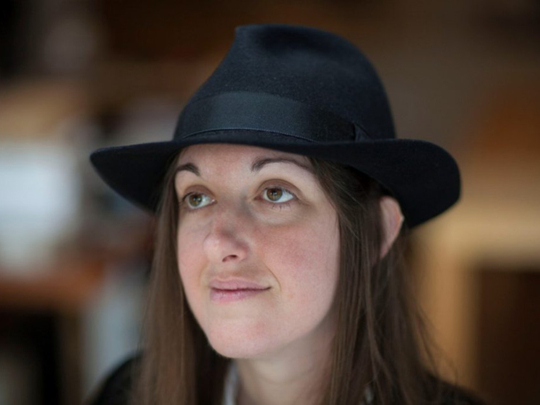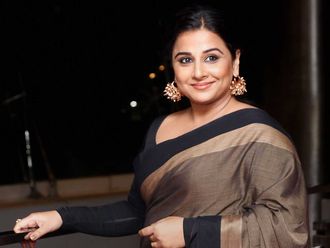
Last year she pulled off a shock by winning one of the grandest prizes — the Costa book of the year — for her teenage novel The Lie Tree over a field of competitors that included Kate Atkinson for A God in Ruins. One year on, Frances Hardinge, with a decade as an author behind her, still finds the win “astonishing, exhilarating and a little frightening”.
“Even after I was shortlisted, I was absolutely certain that I had no chance of winning, so when they read out my name at the award ceremony I was thunderstruck to the point of temporary paralysis,” says Hardinge. “I remain amazed that I managed an acceptance speech comprised of actual sentences. Even now, I can’t quite believe that I won.”
Hailed by judges as “a fantastic story”, Hardinge’s detective novel is the first children’s book to scoop the coveted prize since Philip Pullman win in 2001 for The Amber Spyglass. Admittedly, the Costa award has brought immense recognition and changed her life.
“Until last year I had never been on TV or appeared on a bestseller list. It has been a whirl of interviews and public speaking. I even went back to my old school as a special guest at their prize-giving! It’s all been a little surreal,” she says. In March, she will be attending the Emirates Airline Festival of Literature. She hopes to see the Bastakia Quarter and meet local school groups then.
The Lie Tree, which is set in the Victorian 1860s and follows the story of 14-year-old Faith as she tries to uncover the details of her father’s mysterious death, combines ingredients of mystery, crime, ghost and growing-up stories. Hardinge came up with the core idea of The Lie Tree — a tree that feeds on lies and produces fruit containing secrets — while she was hiking along the Thames path. “As soon as I considered a Victorian setting, the rest of the story began to form in my mind,” she says. “I started to visualise the layers of deception, the murder, and a teenage would-be scientist filled with suppressed anger.”
In The Lie Tree, her seventh book, Hardinge tackles some serious issues — such as Victorian science and women’s rights — and makes them accessible to children without watering them down. But that, she says, was not her sole intent while writing the book. “I am a storyteller. I don’t sit down with a manifesto and then try to wrap a story around it. However, there are problems of the world that concern and fascinate me, and these sometimes emerge in the stories I tell.”
From Verdigris Deep in 2007 and Gullstruck Island in 2009 to Cuckoo Song in 2014 and the recent The Lie Tree, Hardinge’s fictional universe has been mysterious and lush. Playing with genre, she brings together pressing concerns in the multi-layered richness of the narrative. Her books have handled themes like class, gender, prejudice, persecution, cultural miscommunication and censorship among others.
“These subjects are complex, and I don’t pretend otherwise when writing for children,” says Hardinge. “I have a lot of faith in my younger readers. Over-simplifying such important topics, or reducing them to a pat ‘message’, would be dishonest and a little insulting.”
Growing up, Hardinge loved reading and she thanks her parents, who worked in book-selling, for that. “They read to me and my sister when we were young, and our house was always stuffed to the gills with books.” Her favourite authors during childhood included Susan Cooper, Roald Dahl, Leon Garfield, Alan Garner, Nicholas Fisk, Conan Doyle, Catherine Storr, Richard Adams, Terry Pratchett, Douglas Adams and Lewis Carroll.
Children’s books, as most would agree, have life-changing power. Writers from Dahl and Pratchett to Cooper and Carroll have transformative effects upon individual readers and collectively, across generations, upon the world. Yet, children’s books are rarely considered for literary prizes. This is perhaps because many consider them lightweight, believing that since they are easy to read, they are easy to write.
On the contrary, children’s literature is rich and exciting, says Hardinge. “The range of YA books being written right now are experimental, intelligent, daring, entertaining, hard-hitting and varied.”
These are the books that get handed down through generations, becoming classics. Her winning the Costa for The Lie Tree has undeniably drawn people’s attention to children’s literature by raising its profile. This, she says, makes her “very happy”.
In children’s literature, the tradition of writing long series is becoming strong. Hardinge says that although she enjoys reading sequels and trilogies, she’s happier writing standalones. “The truth is, while writing a book I fall disastrously out of love with it so that by the time I finish it the last thing I want to do is write something similar. If I were committed to writing books in the same series back-to-back it would drive me up the wall.”
Children’s books are surely one of the most important forms of writing we have, but there’s no denying the fact that youngsters are also spending more time in front of a screen than they spend reading. The 43-year-old author, admittedly a geek, doesn’t think there’s a need to worry. “I think part of adult anxiety about children’s use of technology arises from a sense that they’re out-pacing us and vanishing into a complex digital world that they understand better than we do. This is indeed happening, and it’s inevitable, but I’m not convinced that it’s a bad thing.”
Ultimately, children will like a book with a great story and love a book that makes them see the world in a new way. Hardinge has undoubtedly already got their attention. She’s been making waves in children’s YA fiction since her first novel, Fly By Night, was published in 2005 and won the prestigious Branford Boase Award. Fly Trap is the only sequel she has ever produced, and she wrote it several years after her debut Fly by Night. She deliberately constructed Fly Trap so that it had its own self-contained story arc. “It’s possible to understand it without having read the first book. I would quite like to write more books in that series, but they would probably be ‘self-contained’ in the same way.”
Unlike some writers who seem to revisit the same territory on a regular basis, mostly because publishers want more of the same, Hardinge’s books are diverse. She hasn’t changed her writing to suit the needs of a market. “It’s easier to sell an author’s work if they have a recognisable ‘platform’ or ‘brand’, so the sheer variety of my books probably hasn’t made life easy!” Her publishers, she says, have been “understanding and flexible” about her “bizarre and eclectic” books.
When it comes to writing, Hardinge tries to be self-disciplined and aims for a standard nine-to-five working day. “But in practice my productivity goes through marked peaks and troughs,” she says. “Sometimes I abandon my computer altogether and go for a long hike, so that I can work through my thoughts and untie the plot-knots in my head.” Currently, she’s working on a historical fantasy set during the English Civil War. Not revealing much about the plot, she says it features “a very angry, very dead bear”.
One of the finest children’s authors, having written seven young adult novels as well as short stories, Hardinge, who considers herself “lucky” to make a living doing something she loves, still remains plagued by doubts.
“I have always been like that. When I was an aspiring author, I was racked with agonising self-consciousness every time I submitted a piece of work. As a professional author, I usually lose all faith in whichever book I am writing, and hate it by the time I finish it,” she says. “Even now after the Costa win, I find myself wondering whether I can live up to people’s increased expectations.”
Despite her achievements in the literary world — both in breadth and depth — she remains modest. “For me every message from an enthusiastic reader feels like a trophy,” she says.
Suparna Dutt-D’Cunha is a writer based in Pune, India.
Frances Hardinge will take part in the Emirates Airline Festival of Literature to be held at InterContinental, Dubai Festival City, from March 3-11, 2017.
QUICK-FIVE:
What would I be if I hadn’t been a writer: An artist, or something involving travel.
A book I wish I’d written: The Harry Potter series, because then I’d be a multi-millionnaire.
The first novel I read: I can’t remember which book I read first, but I know that Roald Dahl’s James and the Giant Peach had a powerful effect on my imagination.
A recent book I will remember in 10 years’ time: Kate Saunders’ Five Children on the Western Front
A book I’d take to desert Island: Alice in Wonderland by Lewis Carroll. Absurdity is sometimes the best way to keep oneself sane.









